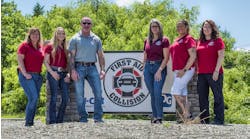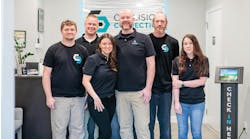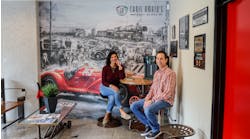One of the key benefits of being a multi-shop operator (MSO) is the ability to perform load leveling between locations. With locations in different communities, an MSO can take whatever work comes through the door without worrying overscheduling. If you run out of capacity at one store, you can shift it (within the limits of your customer and insurance agreements) to another store with idle resources.
For Performance Auto Body, with operations in Parsons and Morgantown, W.V., load leveling isn’t just a nice benefit, it’s a critical part of the company’s success. Owner Warren Judy’s two shops are a study in contrasts: a very large shop in a very small town, and smaller shop in a much bigger city. The symbiotic relationship between the two shops has been key to the profitability of both.
|
At a Glance: Performance Auto Body |
|
Parsons, West Virginia Headquarters location |
|
Warren Judy Owner |
|
2 No. of locations |
|
1 No. of states reached |
|
11 Years in business |
|
ProSpray Paint Supplier |
|
$3 million Annual gross revenue |
|
15 No. of employees |
Judy’s transition from a single shop to an MSO was driven by very practical considerations – his first shop was a very big fish in a very small pond, and relying on local business in Parsons was not going to be sustainable. Fortunately, through a combination of luck and some smart decisions, Judy’s two Performance Auto Body locations complement each other through regular load leveling, ensuring a dependable stream of business at both stores.
Judy first started working on cars as a teenager with his father, and bought and restored his first car before he even had a driver’s license. He began working as a body shop technician as soon as he graduated, in addition to restoring other cars at his father’s private shop. For several years, he worked at a car dealership in Morgantown.
In 2005, itching to start his own business, he was able to purchase a massive facility in Parsons that had already been converted to a body shop by a local Chevrolet dealership. The Parsons location is a 36,000-square-foot converted warehouse that includes a body shop, paint shop, sand blasting shop, offices, and 10,000-square-feet of indoor parking.
“The dealership had done a beautiful job of converting it and it had brand new equipment and two big booths,” Judy says. “Unfortunately, one of the partners in the dealership passed away and the other partner opted to go in a different direction with the body shop and the business. The owner got a hold of me, and I fell in love with the place. They made me an offer, and the owner helped me work through some of the financing issues to help me purchase the first building.”
Unfortunately, Judy soon ran up against a supply and demand problem. Parsons, nestled in the George Washington and Jefferson National Forests, only has a population of around 1,500 people, not enough to sustain a facility with that much capacity. Judy needed a way to bring in more vehicles, so he looked 60 miles to the North to Morgantown.
Morgantown, which sits on the Monongahela River is the largest city in the North-Central region of the state and is home to West Virginia University. The university and two major health systems located in the city have fueled a significant amount of economic and population growth, and although the population is relatively small (around 30,000) it is growing quickly.
The good news for the handful of local autobody shops is that the population growth has outstripped the infrastructure, so there are more vehicles jostling for space on roads that weren't designed to handle that much traffic. “I’d worked at a dealership in Morgantown, and I knew how busy it was in terms of body work,” Judy says.
In 2007, Judy opened a 3,000 square-foot shop in Morgantown with a cross-draft booth. He handles smaller jobs there, and then directs all of the other work he picks up in the larger city to his big facility in Parsons. He has since expanded that location to a 10,000-square-foot leased facility to accommodate the growth in his business.
“When I bought the first shop, we were doing around $400,000 to $500,000 a year,” Judy says. “Now we are up to around $3 million a year between the two locations.”
When he opened the second shop, Judy and a partner invested in a truck and trailer to move the cars back and forth between Parsons and Morgantown. When the truck isn’t moving vehicles, it brings in additional revenue by doing work for local oil and gas operations.
The location of the shops has actually proven to be financially beneficial. The payment on the much larger Parsons shop only costs about half of what Judy is spending to lease the smaller Morgantown shop. If his bigger building was in the larger city, it would be much more expensive to operate. “We do have some overhead and we have to pay to move the cars back and forth, but I don’t know that I’d do it differently if I had to do it over again,” Judy says.
Performance Auto Body currently has 15 employees between the two locations. There is a shop manager/estimator in Morgantown, while Judy is currently handling estimating at the Parsons shop.
Judy’s shops have also benefitted from a friendly competitive landscape. None of the major consolidators or chains have a presence in the region. “The biggest shop here is another independent shop that has a big, beautiful facility,” Judy says. “But honestly, you could probably open two or three more shops here and not even notice, because there’s that much business from Morgantown. There’s a lot of growth, and you can hardly go down a road without seeing a crane putting up a new building. The infrastructure is horrible, and there are just so many cars on these little roads.”
The company has backed off of some of its direct repair program (DRP) relationships, although Judy has maintained a few key insurer relationships. According to Judy, at one point he had nearly 40 employees on the payroll to keep up with the various DRPs. “We’ve had a lot of insurance companies approach us, but we’ve really just dropped back to a couple of DRPs that have been at the core of our business for a long time,” Judy says. “We’re really comfortable with them and we’re good and profitable with those groups.”
The level of walk-in business has also increased. “Now that I’m estimating at the Parsons shop, I’ve seen the majority of what we’re doing is really walk-in business. The DRP is shrinking a bit on its own,” Judy says.
With business booming at the two locations, Judy is eyeing additional expansion into other nearby communities. “I’ve been approached by a couple of shops that want me to buy them out,” Judy says. “If the deal makes sense, I’m not afraid to go in and look. A lot of shop owners are getting frustrated with dealing with the insurance and headaches, and they are looking for a way out.”
That expansion will be delayed somewhat because Judy plans to open up an even larger facility in Morgantown. “I’m within a year or two of my lease being up there, and I want to build a new building,” Judy says. “I’m shooting for it to be around 15,000 square feet, because I’d like to add another booth at that location.”
One of the biggest challenges Judy says his business faces as an MSO is keeping up with the investment required for new technology. Most recently that has involved a substantial purchase of equipment for working on aluminum vehicles. “I know it’s coming, but so far it’s mostly collected dust,” Judy says. “In order stay up with the insurance company requirements and I-CAR you have to have this equipment. We’ve had it about a year, and I think we’ve maybe worked on one aluminum vehicle since we had it. In our small area, it just hasn’t caught on yet.”
He compares it to the work he did to get the shop ready for waterborne paint a few years ago. “We made an investment and trained my painters, and then nothing ever came of it,” Judy says. “We went back to the lower VOC solvents. All of my booths have the equipment to do waterborne, but we don’t use it right now. We’re ready if and when it comes.”
Other than that, he says having two shops has been a blessing. “I really enjoy it, and I wish I could be at the Morgantown shop more often,” Judy says. “I don’t have any complaints, and I’d like to grow even more.”
Having two shops has helped keep business steady across the company. “When things slow down at one shop and are busy at the other, it’s easy for us to load level and that’s a big advantage to having two shops,” Judy says.
In addition to preparing for aluminum repairs, building a new shop, and searching for an acquisition opportunity, Judy is also starting to put some thought into a transition plan for his eventual retirement. “I’d like to be able to groom some employees to start taking over and maybe offer shares in the company, and then shrink down my involvement as I get toward that age,” Judy says. “Eventually I know I want to slow down.”




